

5 Key Takeaways From the Latest Climate Change Report. The latest report from the main international panel charged with assessing climate change, released today in Copenhagen, shouts the same basic message scientists have been telling governments for decades.
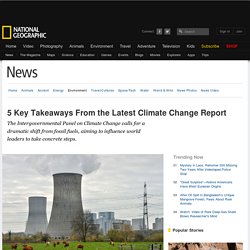
Protecting the planet will require a dramatic shift away from fossil fuels, the report from the Intergovernmental Panel on Climate Change emphasizes. The release was timed for political impact, arriving weeks before international negotiators meet in Lima, Peru, to start forging a new strategy on climate change. "Science has spoken. There is no ambiguity in their message," United Nations Secretary-General Ban Ki-moon said in a news conference this morning in Copenhagen. "Leaders must act; time is not on our side. " The Fifth Assessment Synthesis Report, as it's called, pulls together the conclusions of three IPCC working groups, which issued reports over the past year on the underlying science, the impacts, and the ways to address climate change.
Here are a few takeaways: 1. 2. 3. 4. 5. Climate Change Facts: Answers to Common Questions. This page answers some of the most commonly asked questions about climate change and its impacts.
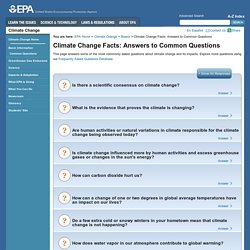
Explore more questions using our Frequently Asked Questions Database. + Show All Responses Is there a scientific consensus on climate change? Answer The major scientific agencies of the United States — including the National Aeronautics and Space Administration (NASA) and the National Oceanic and Atmospheric Administration (NOAA) — agree that climate change is occurring and that humans are contributing to it. Scientists are still researching a number of important questions, including exactly how much Earth will warm, how quickly it will warm, and what the consequences of the warming will be in specific regions of the world. » Learn more about climate change science. Close. Climate Change Explained. How is the climate changing in the U.S.?
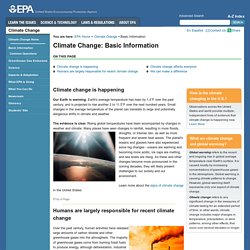
Observations across the United States and world provide multiple, independent lines of evidence that climate change is happening now. Learn More What are climate change and global warming? Global warming refers to the recent and ongoing rise in global average temperature near Earth's surface. It is caused mostly by increasing concentrations of greenhouse gases in the atmosphere. Climate change refers to any significant change in the measures of climate lasting for an extended period of time. Climate Impacts on Ecosystems. Climate Impacts on Ecosystems Key Points Climate change can alter where species live and how they interact, which could fundamentally transform current ecosystems.
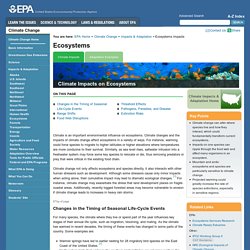
Impacts on one species can ripple through the food web and affect many organisms in an ecosystem. Mountain and arctic ecosystems and species are particularly sensitive to climate change. Projected warming could greatly increase the rate of species extinctions, especially in sensitive regions. Terminology An ecosystem refers to the animals, plants, and microorganisms that live in one place, as well as the environmental conditions that support them. Ecosystem services include the products and services provided by ecosystems, such as food, fuel, timber, water, clean air, and medicines. An ecological threshold is the point at which there is an abrupt change in an ecosystem quality, property, or phenomenon, or where small changes in one or more external conditions produce large and persistent responses in an ecosystem. [3] The Pika 1. NASA: Climate Change May Bring Big Ecosystem Changes.
PASADENA, Calif. - By 2100, global climate change will modify plant communities covering almost half of Earth's land surface and will drive the conversion of nearly 40 percent of land-based ecosystems from one major ecological community type - such as forest, grassland or tundra - toward another, according to a new NASA and university computer modeling study.
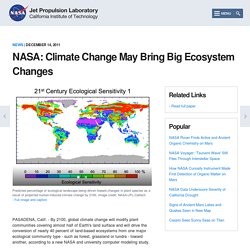
Researchers from NASA's Jet Propulsion Laboratory and the California Institute of Technology in Pasadena, Calif., investigated how Earth's plant life is likely to react over the next three centuries as Earth's climate changes in response to rising levels of human-produced greenhouse gases.
Study results are published in the journal Climatic Change. The model projections paint a portrait of increasing ecological change and stress in Earth's biosphere, with many plant and animal species facing increasing competition for survival, as well as significant species turnover, as some species invade areas occupied by other species.